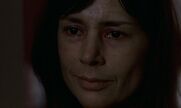The Cries, Whispers, and Silences of God's Absence
--Ingmar Bergman, "The Shout and the Whisper" film review
Author: Jia Mu
Bergman, the missionary's son, as a director, the ultimate concern of religiousness gives his work a deep and expansive classic quality. The work "Shouting and Whispering", written in 1973, analyzes the indifference and alienation between people through the daily story of a dying woman, her two sisters and a maid before and after her death. The sense of abandonment of his life is saturated with the grief of how individual life can be redeemed in the absence of God.
Agnes suffers from an incurable disease and lives in the agony of illness and the fear of death. Sisters Maria, Karin, and Anna, the maid, look after her final days together. The doctor came to make a diagnosis. He cared for the patient like a priest. It was religious comfort. If it was a Chinese doctor, he would usually say "eat whatever you want." Westerners are more direct. The doctor said that Iger Ness is running out of time.
When the doctor left, Maria met his eyes and flirted with him. They had had an extramarital affair overnight. The movie interjects this paragraph. When Maria seduced the doctor, the doctor asked her to look at herself in the mirror, and mercilessly exposed the traces of indifference, worldliness, and desire on her face. She restrained the consternation in her heart with force, and this restrained expression seemed to be a cry. The next day, the doctor who had cheated on him left, and the husband came back. Maria spoke as if nothing had happened. The husband seemed to understand everything in his heart. the study. After an unknown amount of time, Maria pushed open the door, and her husband inserted a dagger into his abdomen. He didn't want to die, and cried out to his wife "help me" in pain and fear.
Maria is a passionate person, she offers to ask for a one-night stand, and when she reunites with the doctor at Agnes's house many years later, she ignites the doctor's lust again. But the doctor is a rational person, even though he accepted a one-night stand many years ago, but he does not take the initiative, does not refuse, and is not responsible. Reason is actually a kind of indifference.
Passionate Maria wants to be friends with sister Karin and restore the intimacy of her childhood. When they were alone, she confided tentatively to Karin, stroking her softly.
Karin rejected her. Karin is a completely indifferent person. Her husband is engaged in diplomacy, has money and status, and is considered high society, but in Karin's eyes, these include exquisite dinners, the form of family, the way of life... "Everything It's all lies." Lies wrapped her like air and couldn't leave it. In fact, she had accepted it, but she was resisting it in her heart. Yes, indifference is a form of resistance.
The only thing in life that caught her attention was accidentally breaking a wine glass, a broken glass on the ground. She played with broken glass indifferently, the opposite of the Chinese people playing with objects with great interest. After dinner, the maid took off her clothes, put on pajamas, and she sat alone on a chair, inserting broken glass into her pussy. She went into the bedroom, lay on the bed, opened her legs, and showed her bloody pussy to her husband. The picture is still depressing, as depressing as a shout. This display of self-mutilation is the extreme of apathetic resistance.
Finally, under Maria's second temptation, Karin accepted. The two of them caressed each other's faces, whispered softly, and the picture was silent. Their lips, fingers, and expressions were all so soft, just like two animals, two cats, two deer, two birds, and two fish. No utilitarian, defenseless, sniffing and dawdling without any grudges... The two are intimate, without mutual dependence or intention. This is probably the best relationship life can have, what Bergman calls "whispering." This set of shots is one of the "eyes" of the film.
Whispering, you can feel from the camera, Chinese is better at expressing this state, lingering and taking precautions, but without a strong meaning, the word lingering is more accurate.
And Agnes, still suffering from illness, only the maid comforted her pain without reservation. She unbuttoned her oversized nightgown, opened her breasts, held the patient in excruciating pain, and put her to sleep.
Agnes finally died. The sisters discussed the division of the funeral and inheritance.
A gentle narrative that ignites abruptly—a master craftsman—Agnes comes back to life. For the Chinese, it's a scam. Although Westerners do not have the panic of cheating the corpse, the sisters are obviously only shocked, not surprised.
Karin walked into the room, in the fear of death, Agnes desperately wanted to grasp the living world, family affection is undoubtedly the most reliable and most recent grasp, but Karin refused her. Karin left with unacceptable footsteps and walked out of the room.
Maria walked into the room, she had a warm nature, accepted the sister's outstretched hands, and returned with an affectionate gaze. But the god of death was suddenly urging, and Agnes, who was extremely terrified, tried her best to grasp the living world, and she tightly clung to Maria's neck. Terrified, Maria broke free, fled, and rushed out of the room.
Agnes finally died in the arms of the maid. Anna was half-naked, Agnes slept forever in her wide open chest, resting on her thick thighs. Anna used her earth-like body to appease the fear of death like a god.
This image is reminiscent of Michelangelo's Pieta. This sculpture by Michelangelo shows man's pity for God, the relationship between man and God is reversed, but both man and God have been sublimated. This shot of Bergman shows the spirit of the earth, which embraces everything with her silent body, soothing the life abandoned by the shouts and whispers.
Maria and Karin, who had experienced the whispers, returned to their original indifference and alienation. They are more indifferent to others, to people of different classes. After dividing the sisters' property, they pretended to pay Anna a little extra, and generously allowed her to stay a few more days in Agnes' house, and take a deceased's relic as a souvenir. Anna refused, she didn't want to take anything, she just wanted to be a good person.
At the end of the film, Anna opens the diary of the deceased, how eager and hopeful the deceased had been to whisper... but it was only a hopeless cry. In the end, only Anna soothed her with the silence of the earth.
Shouting and whispering.
Crying is a state of isolation in individual life, and the relationship between people is indifferent and alienated. Agnes' cry was her sickness, her fear of death, unspeakable. Maria's cry is that she finds her enthusiasm insincere and bewildered. Karin's cry was that her indifference finally killed herself, and she couldn't stand her indifference.
Whispering is the natural intertwining of life with nothing to ask for, and in the relationship between people, the divine comfort to the lonely individual is realized.
Clearly, Bergman's film shows the essence of the modern world: the absence of God. In the absence of God, is there only shouting and whispering in individual life? In the role of Anna, Bergman adds silence to us. If the human relationship loses the possibility of whispering, is there only a lonely cry left? No, there is the earth, and the earth embraces everything with her silent body, soothes everything.
- Dedicated to Anna
Jia Mu, May 14, 2019 at Yuezhao West Building, Beijing
View more about Cries & Whispers reviews











